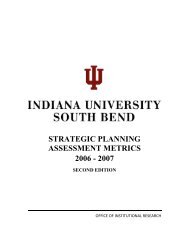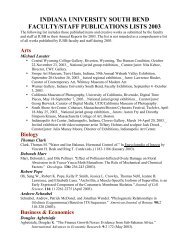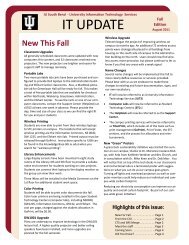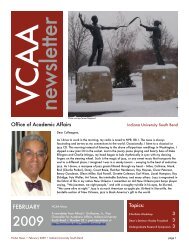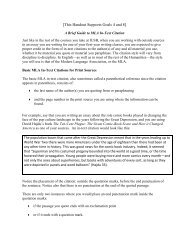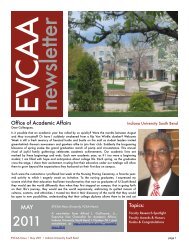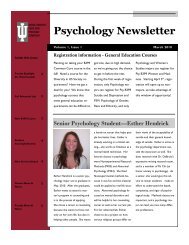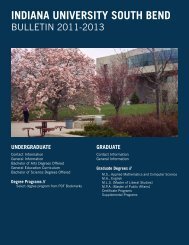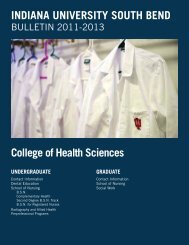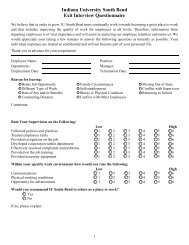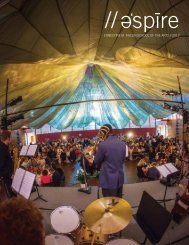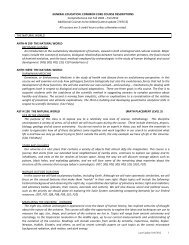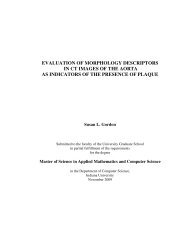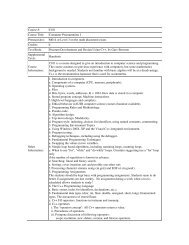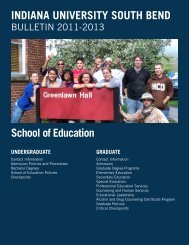Current version - Indiana University South Bend
Current version - Indiana University South Bend
Current version - Indiana University South Bend
Create successful ePaper yourself
Turn your PDF publications into a flip-book with our unique Google optimized e-Paper software.
MUSIC 451<br />
of piano class, MUS-P 104 Piano Class 4, without having<br />
attempted the examination are required to do so during<br />
that fourth semester.<br />
Students are entitled to enroll in one semester of studio<br />
instruction in piano MUS-P 200 Piano upon completion<br />
of the piano class sequence (or earlier, with faculty<br />
permission). Enrollees in MUS-P 200 Piano take the<br />
piano proficiency examination at the end of the semester.<br />
Note: All students majoring in a keyboard instrument<br />
must take the piano proficiency examination no later<br />
than the end of their first semester of study.<br />
Students who intend to attempt the examination in<br />
a given semester enroll that semester in the noncredit<br />
course number MUS-P 105 Keyboard Proficiency. The<br />
successful completion of the examination confers the<br />
grade of S; the completion of only part of the examination,<br />
or failure to pass any part of the examination, results in<br />
the grade of I. The refusal to attempt the examination<br />
results in the grade of F. Once students pass part of the<br />
examination, they must attempt it in each succeeding<br />
semester until all are passed. However, they need not<br />
reenroll in MUS-P 105 Keyboard Proficiency.<br />
Requirements for Keyboard Proficiency<br />
Basic examination required for all degree programs in<br />
music:<br />
• Playing any major scale, two hands together, two<br />
octaves.<br />
• Reading a melodic line at sight, incorporating a simple<br />
accompaniment.<br />
• Sight-reading a four-part chorale, hymn, or community<br />
song.<br />
• Sight-reading as follows:<br />
——<br />
Voice (B.M., B.S.): an accompaniment to an art song.<br />
——<br />
Instrumental (B.M., B.S.): an accompaniment to an<br />
instrumental solo.<br />
——<br />
Keyboard (except organ) (B.M., B.S.): the piano part<br />
of an ensemble piece such as a Mozart sonata for<br />
piano and violin.<br />
• Playing a Roman numeral chord progression, such as<br />
I IV ii6 V7 I, in a major key (to four sharps or flats).<br />
• Perform a prepared repertoire piece from the last<br />
semester of the piano class sequence (or similar level<br />
for transfer students, such as a movement from a<br />
Clementi sonatina. Acceptable repertoire can be found<br />
in Alfred’s Group Piano for Adults Book 2, pgs. 341-73<br />
or any piece from Easy Classics to Moderns Vol. 17).<br />
• Additional requirements (required of students in the<br />
degree programs indicated):<br />
——<br />
Piano and Organ (B.M., B.S.): Scales and arpeggios,<br />
major and minor keys, in sixteenth notes, two<br />
hands—four octaves, quarter note = M.M. 144.<br />
——<br />
Organ (B.M., B.S.): Chorale style improvisation,<br />
modulation to any key.<br />
——<br />
Organ (B.M., B.S.): Transposition of a hymn by a<br />
half or whole step in either direction. Sight-reading<br />
of vocal score.<br />
——<br />
Voice (B.M., B.S.): Sight-reading a solo vocal part<br />
together with the piano accompaniment.<br />
——<br />
Composition (B.M.): Sight-reading (from score)<br />
a portion of a Classical period string quartet (slow<br />
movement). Realize in four parts a Roman numeral<br />
progression which modulates to a distantly related<br />
key, and which may include chord types such as<br />
the augmented sixth, Neapolitan sixth, altered<br />
dominants, etc. Sight-reading a portion of a<br />
twentieth century piano work of moderate difficulty,<br />
e.g., Bartók Mikrokosmos, Vol. V.<br />
Candidates for the Bachelor of Music in keyboard<br />
degree must meet all the requirements for their major<br />
instrument.<br />
The keyboard placement test for graduate and transfer<br />
students is:<br />
• Play any major scale, two hands together, two octaves.<br />
• Play a Roman numeral chord progression (in a major<br />
key to four sharps or flats) in left hand with melody<br />
in right hand. Play chord progression alone first, then<br />
add the melody.<br />
• Sight-read a four-part chorale or hymn.<br />
Bachelor of Arts in music<br />
The Bachelor of Arts in music at IU <strong>South</strong> <strong>Bend</strong> is a<br />
liberal arts degree program with a major in music and<br />
a degree focus that combines general education with<br />
studies in musicianship and an area of emphasis in<br />
music such as performance, theory and music history,<br />
and composition.<br />
The degree program will complement undergraduate<br />
degrees in music already offered at IU <strong>South</strong> <strong>Bend</strong>:<br />
Bachelor of Music and Bachelor of Science in Music. The<br />
Bachelor of Music is aimed to exceptional performers or<br />
composers; it has a strong emphasis on performance and<br />
recital requirements. The Bachelor of Science in Music<br />
has a concentration in an outside field. Its goal is to help<br />
students create specific connections with another area of<br />
knowledge with the ultimate goal of specialization with



